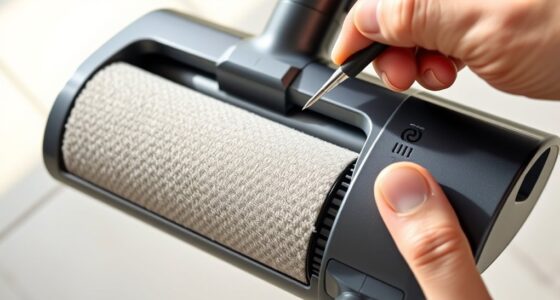If your vacuum smells like plastic, burning, or musty, it’s likely due to airflow issues, filter buildup, or motor overheating. Check and clean or replace filters regularly, as poor maintenance causes trapped debris and odors. If you notice a burning smell, the motor may be overheating from blocked vents or debris. Addressing these issues promptly helps prevent damage and keeps odors at bay—continue exploring to learn more about fixing these common problems.
Key Takeaways
- A burnt plastic smell typically indicates motor overheating or plastic parts burning due to restricted airflow.
- Musty odors suggest trapped debris decay inside filters or hoses, often from poor filter maintenance.
- Plastic smells can also arise from melted or damaged plastic components caused by excessive heat or electrical issues.
- Burning odors may result from motor overheating, blocked vents, or debris causing friction and heat buildup.
- Regularly check and clean filters, vents, and hoses to prevent airflow restrictions that lead to strange, unpleasant smells.

Have you ever noticed a strange smell coming from your vacuum cleaner? If so, it’s likely a sign that something isn’t quite right inside. One common cause is poor filter maintenance. Over time, filters trap dust, dirt, and debris, but if they become clogged or dirty, airflow gets restricted. This not only reduces your vacuum’s efficiency but can also lead to unpleasant odors. When filters aren’t cleaned or replaced regularly, trapped debris can start to decay, releasing musty or foul smells. To prevent this, make it a habit to check your filters frequently. Clean or replace them as recommended by the manufacturer, especially if you notice the smell intensifying. Proper filter maintenance ensures your vacuum runs smoothly and keeps those unwanted odors at bay.
Another critical issue linked to strange smells is motor overheating. Your vacuum’s motor works hard to generate suction, but if it overheats, it can emit a burnt or plastic-like smell. Overheating often occurs when airflow is blocked or restricted, which can happen if filters or vents are clogged. When the motor gets too hot, it may start to burn the surrounding plastic or insulation, creating a distinct plastic or burning odor. This doesn’t just smell bad; it’s a sign that your vacuum could be at risk of damage or failure. To prevent motor overheating, always check for blockages in the hose, brush roll, and vents. Avoid running your vacuum on high power for extended periods, especially if it feels unusually warm. Regularly cleaning and maintaining your vacuum’s filters and ensuring proper airflow keeps the motor cool and functioning properly. Additionally, understanding vacuum airflow can help you identify and troubleshoot common issues more effectively.
Frequently Asked Questions
Can Vacuum Smells Indicate a Hidden Electrical Fire Risk?
You might wonder if vacuum smells signal a hidden electrical fire risk. While some odors can indicate electrical hazards, not all do. Burning or plastic smells could point to wiring issues, so it’s essential to prioritize fire prevention. Regularly inspect your vacuum for damaged cords or overheating parts. If you notice unusual smells, disconnect the vacuum immediately and have a professional check it to prevent potential electrical hazards and guarantee safety.
How Often Should I Replace Vacuum Filters to Prevent Odors?
Ever wondered how often you should replace your vacuum filters to keep odors at bay? Regular filter maintenance is key to odor prevention, so it’s recommended to change filters every 3 to 6 months, depending on usage and manufacturer guidelines. Doing so prevents musty or burning smells and maintains ideal airflow. Don’t wait until odors become noticeable—staying proactive ensures your vacuum stays fresh and effective.
Are Certain Vacuum Models More Prone to Producing Strange Smells?
Certain vacuum models are more prone to producing strange smells due to their vacuum design and manufacturing quality. Cheaper or poorly designed vacuums often lack proper seals or filters, leading to lingering odors like plastic or burning smells. Higher-quality models with better construction and thoughtful design tend to minimize these issues, offering more effective odor control. So, investing in a well-made vacuum can help reduce unpleasant smells over time.
Can Using Certain Cleaning Agents Cause Vacuum Odors?
Ever wondered if your cleaning chemicals could cause vacuum odors? Yes, they can. Some cleaning agents contain strong fragrances or chemicals that linger in your vacuum, leading to unpleasant smells. To prevent this, opt for odor prevention strategies like thoroughly rinsing your vacuum components after cleaning. Using gentle, scent-free cleaning chemicals helps minimize odors and keeps your vacuum smelling fresh, so you can enjoy a cleaner, healthier home environment.
Is It Safe to Use My Vacuum if It Emits a Burning Smell?
If your vacuum emits a burning smell, don’t ignore it. This vacuum odor cause could indicate overheating or a motor issue, which can be unsafe. Stop using the vacuum immediately and unplug it to prevent further damage or potential fire hazards. Follow safety precautions by inspecting for debris or worn parts, and consider having it checked by a professional before resuming use. Your safety comes first.
Conclusion
So, next time your vacuum suddenly smells like plastic, burning, or mustiness, remember that these odors often coincide with specific issues. Sometimes, a simple filter change or cleaning can fix the problem, while other times, it’s a sign of something more serious. Don’t ignore these smells—they’re clues. By paying attention, you might just discover that a quick fix or a lucky coincidence saved you from costly repairs. Stay alert, and your vacuum will serve you well!









